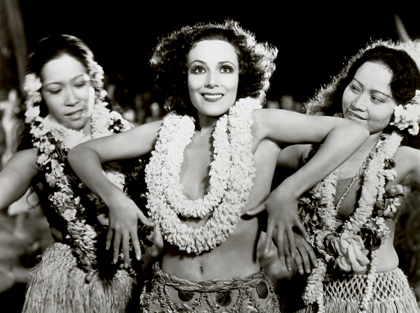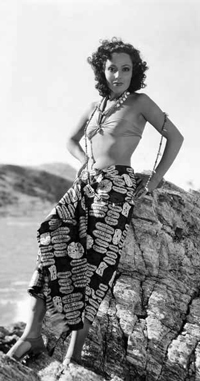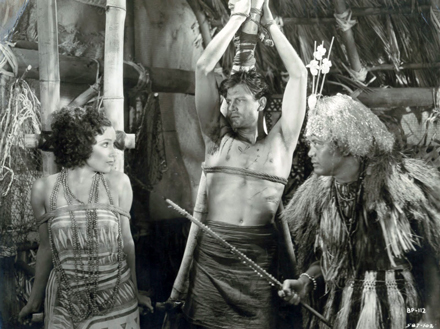
 |
|
|
|
Talk about zeroing in on the hot stuff in Pre-Code cinema! Producer-director King Vidor's Bird of Paradise must have sent bluenoses fainting to the floor in the dear deep Depression year of 1932. One of the better South Seas Island Idyll movies, it nevertheless is based on the dated notion that races shouldn't mix. Top billed Dolores del Rio (a Polynesian maiden by way of Durango, Mexico) and the talented star Joel McCrea are Tiki-crossed lovers separated by native superstitions, in this case a nasty volcano. Vidor's excellent direction, the swooningly erotic performances of the stars (well, at least in some scenes) and a polished production make Bird of Paradise an attractive movie even before mention of its hot-cha Pre-Code content. We're told that RKO executive David O. Selznick purchased the play that forms the basis of Bird of Paradise, and to hired the artistic King Vidor from MGM to direct it. Vidor so ably invigorates the island sequences that the play's influence seems strongest in the scenes on the yacht, which seemingly wanders the South Seas in search of exotic adventure. The wise Mac (John Halliday) encourages the handsome sailor Johnny Baker (Joel McCrea) to take a break from his labors and, while he still has his youth, pursue native love. 
The yacht is greeted by the friendly natives, and Johnny is saved from a shark by Luana (Dolores del Rio), who swims to his rescue with a knife. At a wild dance that evening, all the young native men run off into the dark with the nubile dancers, but the King (Napoleon Pukui) prevents Johnny from doing the same with the willing Luana -- she is his daughter and has been promised in marriage to a prince. Worse yet (and rather contradictory), Luana has also been promised to the fire god Pelee, should the need come to appease the island's giant volcano. Luana and Johnny sneak out together anyway, are separated, and then run off when he steals her on her wedding night. They set up a rustic house on a nearby island and are wildly happy until an eruption commences. The entire tribe -- and Luana herself -- believes that it is her duty to fulfill her destiny with the volcano.
Every young man knows how heartbreaking love can be. You knock yourself out to find the right girl and before you know it she's left her key with a note saying she's jumping into a volcano. Bird of Paradise deals in exotic, erotic and far-fetched escapism, based on some As it turns out, Dolores del Rio's Luana is the sexual aggressor in the relationship, an angle that was probably angered the Catholic busybodies and twisted censors more than the sex content itself. Luana entices Johnny off his yacht by appearing nude in the water. She commands him to keep kissing her -- the movie subscribes to the "savage maiden discovers the joy of the white man's kiss" theme. Then she insists that he initiate lovemaking by pretending to fight. Del Rio is an erotic wonder in these scenes. Yes, her nude swim may have been performed by a double, and the underwater light is such that she may be wearing some kind of flimsy garment. But she also goes through at least 3/4 of the movie essentially topless, strategically decorated with some flower leis. Ms. Del Rio is also a fine dancer. Choreographer Busby Berkeley is said to have arranged the modest dance numbers, and Luana's highly suggestive solo dance draws from Hawaiian, Tahitian, and 42nd street traditions in equal measure. The real sex in Bird of Paradise is a matter of attitude. Luana is assertive and direct in her sexuality, and still feminine as all get-out. The idea of being attuned to nature is not a joke -- this young princess knows she's in bloom, and has maybe fifteen years before she becomes fat like most of the older women of her tribe. Bird of Paradise communicates the urgency of love. 
The superstitious curse that pulls Luana and Johnny apart is mostly invented, yet says more about the way western drama structures its adventures among natives of color, any color. It's okay for Johnny to sow some wild oats in the islands, but Luana isn't for him. He can't take her home to his uptight family, after all. Johnny may be willing to defy the rules but Luana is not -- she fervently believes that her people need her more. The ugliness of the concept enters when it is assumed that the native culture offers savage and unjust solutions for problems, like sacrificing women to volcanoes. (Well, primitive cultures aren't all that more fair to women than we are, I guess.) It's just that too many classics of western fiction and dramaturgy find an easy solution to an inconvenient relationship by killing off the 'dark' woman, to allow the hero to return to his own kind back in civilization. Bird of Paradise at least has the decency to keep Johnny's "proper" mate off-screen. We're also supposed to accept the idea that the natives will allow the whites to shoot down their medicine man and the jilted prince, and not ambush the yacht at the first opportunity. King Vidor's direction floats the dreamlike Bird of Paradise on an intoxicating rush of images and sensations. The cinematography frames the lovers in natural surroundings and scenes are staged for maximum economy. Vidor organizes action in depth and the camera placement is so adept that we don't notice the relatively slight use of moving camera setups or crane shots. When the camera moves, it's for a reason. Bird of Paradise is also said to have one of the first wall-to-wall soundtrack scores, by the great Max Steiner. The "native" rhythms resemble themes in Steiner's work from King Kong to The Searchers, but the modern-sounding underscoring enhances every scene. Come to think of it, much of Bird of Paradise reminds us of King Kong. The Schoedsack film The Most Dangerous Game was filmed on some of the same sets as the landmark monster movie, but this show has a similar relationship between interior jungle sets and impressive orchestral music. Finally seeing all of Bird of Paradise for the first time, I can risk asserting that it must have been writer-director John Patrick Shanley's inspiration for his marvelous 1990 philosophical comedy Joe Versus the Volcano (Hey, where's a Blu-ray for that one, Warners?) Besides the basic life-threat of the volcano waiting at the conclusion, Bird of Paradise dissolves from the fiery caldera to the RKO logo, which indeed utilizes the same crooked lightning bolt image repeated several times in Joe. See the now partly obsolete discussion of the lightning-bolt mystery in my old (from 2000) Savant Article. Kino Classics "The Selznick Collection" Blu-ray of Bird of Paradise was mastered, the box reports, "from an original nitrate 35mm print preserved by the George Eastman House Motion Picture Department." I guess that explains why the copies I've seen on TV for forty years (make that tried to see) are virtually unwatchable. 
The first five minutes of Kino's Blu-ray are a bit alarming, as the picture seems unsteady and dark and the soundtrack is a little thick and unclear. But then the quality improves substantially and doesn't sag again. The transfer is intact, the sound healthy and the image quite good -- it's just a little contrasty here and there. I don't know if Bird of Paradise reverted to Selznick or if it fell into disrepair when the Production Code came in and (presumably) forbade its reissue. Frankly, those old TV prints were so murky that one couldn't tell how Dolores del Rio was or wasn't dressed. After getting through the title sequence this Blu-ray allows us to appreciate King Vidor's film almost as did audiences back in 1932. I've heard that the nude swim sequence in Tarzan and His Mate was censored, but don't know if that happened for its initial release or only when the Production Code came in. I suspect the latter. The swim here takes place at night, and is a bit more stylized and mysterious. Not to mention the unachievable dream of every young male on the planet. Well, a majority. Bird of Paradise was granted a month's filming in Hawaii, which reportedly became a literal disaster when a storm blew away the sets and denuded the palm trees. That's why many scenes were filmed on Catalina Island, 26 miles from San Pedro and a day trip on the Great White Steamer (that I was able to take just before it closed down in 1976). In some scenes Luana's island is a verdant paradise, and in others it looks like Noveh-Jetation Atoll -- rocks, scrub plants and not much else.
On a scale of Excellent, Good, Fair, and Poor,
Bird of Paradise Blu-ray rates:
Reviews on the Savant main site have additional credits information and are often updated and annotated with reader input and graphics. Also, don't forget the 2011 Savant Wish List. T'was Ever Thus.
Review Staff | About DVD Talk | Newsletter Subscribe | Join DVD Talk Forum |
| ||||||||||||||||||